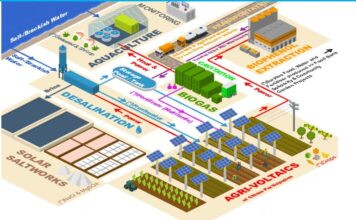€11 million project has been described as “ingenious”
While the government is focused on spending upwards of €180 million on a desalination plant for the Algarve that carries multiple downsides for the local environment, a completely different approach to addressing water scarcity – one that works with Nature, generating food and electricity at the same time – is being inaugurated tomorrow in Mexilhoeira Grande.
When the Resident first brought the news of the CisWEFE-NEX project, backed by funding under the European Commission’s Horizon Europe programme, it was desperately looking for a suitable site for a five-year pilot project. The race was on to find the site before the offer of €10 million in funding expired.
Luck would have it that the ‘perfect site’ was found in Mexilhoeira Grande – six hectares that can be used to create an agro-voltaic zone, irrigation ponds, salt pans and water treatment and desalination units.
The beauty of this “fully integrated and circular system” is that nothing ‘goes to waste’ – or, as in the case of traditional desalination plants, ‘goes to harm’.
The new demonstration unit will show how even ‘difficult to shift’ by-products of desalination can be repurposed via solar salt pans to create, for example, epsom salts.
As one of the project’s myriad local partners, In Loco, told us in February, developing this project locally will promote the Algarve as “a new European destination for science; a circular economy lighthouse at world level”.
Since those conversations, Portimão municipality has shown its interest, describing the initiative as representing “a valuable contribution to solving one of the biggest problems affecting us and the local economy, which is largely dependent on tourism. Anything that improves the water efficiency and sustainability of this area is very welcome and should be supported”. Indeed, other local partners include the CCDR Algarve and the municipalities of Tavira and Olhão.
Funded by Cluster 6 of Horizon Europe and part of the Circular Cities and Regions initiative, CisWEFE-NEX is aligned with the European Union’s objectives of climate change adaptation, bioeconomy and sustainable innovation.
“By fostering collaboration between sectors, the project aims to establish a framework for environmental resilience and community empowerment through innovative, nature-based solutions”, emphasises project coordinator Pilar Zapata, from Bioazul, S.L.
The principal source behind this innovative approach is environmental scientist Sascha Iqbal, who divides his time between Switzerland and the Algarve.
He told us earlier this year how he had been listening to media stories about drought in the Algarve “back in 2019” and wondered what he could do. “I thought perhaps I could find a solution with science”…
The rest, as the saying goes, is history.
For an idea of how CisWEFE-NEX works an online video can be found here.
The five-year project brings together a prominent international consortium from nine countries that includes national partners such as INOVA+, MORE CoLAB, In Loco, Dariacordar, Coopérnico, IDAD and REQUIMTE, as well as other leading European organisations.
As Sascha Iqbal explained, this ‘fully integrated system’ is not the kind that could serve entire regions: it is more one that businesses/ hotels/ resorts/ golf courses/ farms and farming cooperatives, saltern owners and such like, would use to help themselves, and, at the same time, help create a much more sustainable future.
natasha.donn@portugalresident.com




















